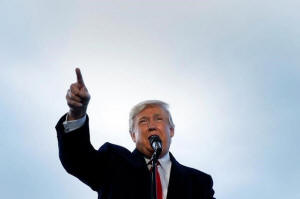|
Americans want Trump to focus on
healthcare first: poll
 Send a link to a friend
Send a link to a friend
 [November 18, 2016]
By Chris Kahn [November 18, 2016]
By Chris Kahn
NEW YORK - Healthcare is the top issue
Americans want Donald Trump to address during his first 100 days in the
White House, according to a Reuters/Ipsos poll released on Thursday, an
apparent rebuke of outgoing President Barack Obama's signature reform,
Obamacare.
Some 21 percent of Americans want Trump to focus on the healthcare
system when he enters the White House on Jan. 20, according to the Nov.
9-14 poll, conducted in the week after the Republican won the U.S.
presidential election.
Jobs took second place with 16 percent of Americans hoping it would be
Trump's first agenda item, while immigration came third - picked by 14
percent of Americans, according to the poll. Some 11 percent picked race
relations.
[Graphic: What should Trump prioritize in his first 100 days?
http://tmsnrt.rs/2fZRP4V]
The poll shows what priorities Americans would set on the new president,
but it does not measure exactly what people want him to do. A separate
Kaiser Health Tracking Poll found in late October that most Americans
want cheaper prescription drugs and access to larger networks of doctors
and hospitals. Only a minority, 37 percent, want to repeal Obamacare
altogether and start over, as Trump has promised to do.
"We can't afford it -- that's the problem," said Daphne Saunders, 50, of
LaFollette, Tennessee, who took the Reuters/Ipsos poll, explaining why
she picked healthcare as the top issue.
Saunders lost her employer-subsidized insurance when she left a job at a
university in 2011 and has been paying roughly $300 per month since then
for check-ups and prescription drugs to manage a heart condition and
diabetes.

She said the cheapest Obamacare plan would cost her $450 per month with
a $50 co-pay every time she saw a doctor.
"Those premiums should be more manageable," Saunders said. "I would
expect to pay no more than $100" per month.
Obama's 2010 Affordable Care Act has been credited with expanding
coverage to as many as 25 million people. But the law has been weakened
through various legal challenges. Some of the biggest health insurers
have pulled out of insurance exchanges after losing money, and insurance
premiums have increased for those who do not receive government
insurance subsidies.
Trump has promised to repeal Obamacare with "something that works,"
though he has not articulated what he would propose in its place. It is
also not clear how swiftly a Trump administration and
Republican-controlled Congress could change the law.
Obama said this week he would endorse a Trump plan if it improved the
healthcare system while insuring the same number of people.
[to top of second column] |

Donald Trump attends a campaign event in Wilmington, Ohio, U.S.
November 4, 2016. REUTERS/Carlo Allegri

GETTING USED TO 'PRESIDENT TRUMP'
The poll also found that Americans have mostly accepted the result
of the Nov. 8 election, after one of the most divisive campaigns in
memory. Some 85 percent said they accept the results as legitimate,
and 63 percent said they would support the new president.
The 2016 campaign appears also to have mostly energized the public.
Some 45 percent of Americans say they "feel more motivated" to vote
in future elections, and 42 percent are more motivated to read and
inform themselves about politics.
A majority of Americans still think the country is headed on the
wrong track, however, and their expectations for a Trump presidency
differed according to party membership.
Most Republicans were optimistic about his presidency, while most
Democrats were pessimistic.
Overall, a plurality of Americans believe Trump will be helpful for
businesses and corporations, military veterans, people who work in
the manufacturing industry, the middle class and the elderly. A
plurality also believes that he will be harmful for gays, women,
blacks, Hispanics, and people living in poverty.
The Reuters/Ipsos poll is conducted online in English in all 50
states. It included 1,782 American adults and has a credibility
interval, a measure of accuracy, of 3 percentage points.
(Editing by Richard Valdmanis and Alistair Bell)
[© 2016 Thomson Reuters. All rights
reserved.]
Copyright 2016 Reuters. All rights reserved. This material may not be published,
broadcast, rewritten or redistributed.
 |